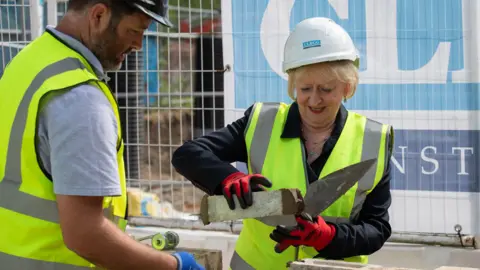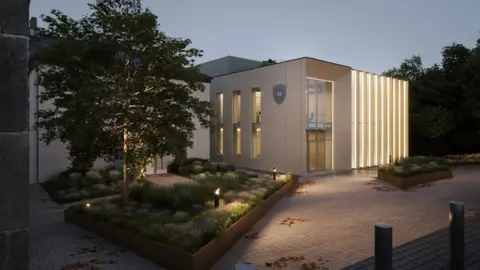Expanded neuroscience centre will 'improve lives'
 University of Sheffield
University of SheffieldWork has begun on a £24m project to expand a world-renowned neuroscience research facility at the University of Sheffield.
A bricklaying ceremony took place at the Sheffield Institute for Translational Neuroscience (SITraN) on Wednesday to mark the start of the work.
According to the University of Sheffield, the project will double the research capacity of the facility, which studies neurological diseases such as Alzheimer's, Multiple Sclerosis, Parkinson's and Motor Neurone Disease.
Director of SITraN, Dame Prof Pamela Shaw, said the upgrade would help researchers in their "ultimate goal of finding transformative breakthroughs that are making curative therapies a reality in our lifetimes".
She said: "Over 20 years ago a lady with MND asked me what I would do with £20m of funding for MND research.
"I didn't think it was a serious question, but I described SITraN - a dedicated facility to bring together scientists, doctors and patients from all over the world under one roof with a shared ambition to improve the lives of people living with neurodegenerative diseases.
"It is quite remarkable how far we have come since SITraN first opened."
Established in 2010, the university said SITraN had outgrown its current capacity, with an initial research team of 64 now exceeding 300.
The expanded building will be constructed adjacent to the current facility, opposite the Royal Hallamshire Hospital.
Representatives of the The Ian Pratt MND Foundation and the Mel Evans Foundation attended for the brick laying ceremony as well as the family and friends of Tim Shone and Gemma Middleton, who both died with MND.
 University of Sheffield
University of SheffieldA university spokesperson said the project would not have been possible "without the unwavering generosity of a number of dedicated families whose lives have been forever changed by the cruelty of MND".
Gemma's father, Nigel, said: "Gemma believed in Sheffield's research, she did everything she could to help SITraN's researchers to find a cure for MND.
"We have an amazing team who continue to raise funds in Gemma's memory and we know that research into new treatments, and ultimately a cure, is the only way we can end the pain MND causes to families like ours."
Last month a charity walk raised more than £100,000 for the new building, in which 400 staff, students and friends of the university trekked 20 or 30 miles through the Peak District.
Listen to highlights from South Yorkshire on BBC Sounds, catch up with the latest episode of Look North
